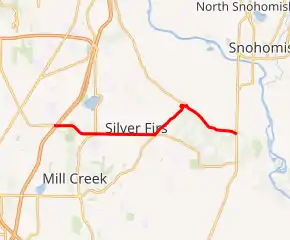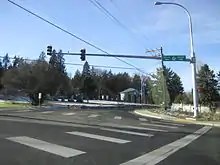Washington State Route 96
State Route 96 (SR 96) is a 6.75-mile-long (10.86 km) state highway located within Snohomish County in the U.S. state of Washington. The highway travels east from an interchange with Interstate 5 (I-5) in Paine Field-Lake Stickney through Mill Creek and an intersection with SR 527 to end at SR 9 south of Snohomish. SR 96 was established in 1991 and follows the route of a wagon road constructed by Snohomish County in the late 1880s to connect Snohomish to Seattle. The highway was closed during the Great Coastal Gale of 2007 after a culvert was damaged and its eastern terminus was re-constructed in 2009 to serve increasing volumes of traffic.
| ||||
|---|---|---|---|---|

SR 96 highlighted in red | ||||
| Route information | ||||
| Auxiliary route of SR 9 | ||||
| Defined by RCW 47.17.153 | ||||
| Maintained by WSDOT | ||||
| Length | 6.75 mi[1] (10.86 km) | |||
| Existed | 1991[2]–present | |||
| Major junctions | ||||
| West end | ||||
| East end | ||||
| Location | ||||
| Counties | Snohomish | |||
| Highway system | ||||
| ||||
Route description
SR 96 begins as 128th Street at a diamond interchange with I-5 in Paine Field-Lake Stickney, located in suburban Snohomish County south of Everett.[3] The highway travels east and crosses the Interurban Trail and North Creek before turning southeast onto 132nd Street and entering the city of Mill Creek.[4] SR 96 passes north of McCollum Pioneer Park and Henry M. Jackson High School before it intersects SR 527 at a commercial center known as Murphy's Corner. The highway continues east and passes Archbishop Murphy High School before turning northeast onto Seattle Hill Road and ascends the eponymous hill into Silver Firs. SR 96 descends southeast into the Snohomish River valley from Larimers Corner to Rees Corner on 131st Street, ending at an intersection with SR 9 south of Snohomish.[1][5]
Every year, the Washington State Department of Transportation (WSDOT) conducts a series of surveys on its highways in the state to measure traffic volume. This is expressed in terms of average annual daily traffic (AADT), which is a measure of traffic volume for any average day of the year. In 2011, WSDOT calculated that the busiest section of SR 96 was its western terminus at I-5, serving 43,000 vehicles, while the least busy section is its eastern terminus at SR 9, serving 11,000 vehicles.[6]
History
Seattle Hill Road and 131st Street have existed since 1885 on their present route as part of a wagon road constructed by Snohomish County connecting Snohomish to Seattle.[7][8] The highway from Seattle Hill through Mill Creek was completed by the late 1950s and paved in the early 1960s by the county.[9][10] The road's westernmost segment was previously named "Post Road" and was extended to Paine Field in the late 1960s, a few years after its interchange with I-5 was opened in 1965.[11] SR 96 was added to the state highway system and codified in 1991, traveling east from I-5 to SR 9 via Mill Creek.[2] Seattle Hill Road was bypassed to the south by Cathcart Way in 2004, planned by the county government since 1978 to redirect traffic on the two-lane SR 96.[12][13] During the Great Coastal Gale in December 2007, Seattle Hill Road was washed out by a damaged culvert and subsequently closed until late January as WSDOT crews repaired the highway.[14][15] The eastern terminus of SR 96, an intersection with SR 9, was expanded between April 2008 and December 2009 by WSDOT, adding turning lanes and a traffic camera.[16]
Major intersections
The entire highway is in Snohomish County.
| Location | mi[1] | km | Destinations | Notes | |
|---|---|---|---|---|---|
| Paine Field-Lake Stickney | 0.00– 0.12 | 0.00– 0.19 | Western terminus, interchange | ||
| Mill Creek | 1.37 | 2.20 | |||
| | 6.75 | 10.86 | Eastern terminus | ||
| 1.000 mi = 1.609 km; 1.000 km = 0.621 mi | |||||
References
- Staff (2012). "State Highway Log: Planning Report 2012, SR 2 to SR 971" (PDF). Washington State Department of Transportation. pp. 802–805. Retrieved February 23, 2013.
- "47.17.153: State route No. 96". Revised Code of Washington. Washington State Legislature. 1991. Retrieved February 23, 2013.
- "SR 5 - Exit 186: Junction SR 96/128th St SW" (PDF). Washington State Department of Transportation. May 5, 2009. Retrieved February 23, 2013.
- Interurban Trail (PDF) (Map). Community Transit. 2010. Retrieved February 23, 2013.
- Google (February 23, 2013). "State Route 96" (Map). Google Maps. Google. Retrieved February 23, 2013.
- Staff (2011). "2011 Annual Traffic Report" (PDF). Washington State Department of Transportation. pp. 117–118. Retrieved February 23, 2013.
- "Snohomish County: Highway's history". The Seattle Times. May 24, 2006. Retrieved February 23, 2013.
- Washington: Snohomish Quadrangle (JPG) (Map). 1:250,000. United States Geological Survey. October 1897. Retrieved February 23, 2013.
- Seattle, 1958 (JPG) (Map). 1:250,000. United States Geological Survey. 1958. Retrieved February 23, 2013.
- Seattle, 1965 (JPG) (Map). 1:250,000. United States Geological Survey. 1965. Retrieved February 23, 2013.
- "3 Interchanges To Open Next Month". The Seattle Times. March 25, 1965. p. 1.
- Velush, Lukas (September 10, 2006). "Why can't Cathcart Way be a highway?". The Everett Herald. Retrieved March 8, 2019.
- Whitely, Peyton (May 14, 2003). "New stretch links Highway 9, I-5". The Seattle Times. Retrieved May 5, 2009.
- Staff (December 3, 2007). "Seattle Hill Road closed between Mill Creek, Snohomish". The Everett Herald. Retrieved February 23, 2013.
- Velush, Lukas (January 21, 2008). "State fixes Seattle Hill Road quickly, cheaply". The Everett Herald. Retrieved February 23, 2013.
- Chi, John (December 2009). "SR 9 - 176th to Marsh Road - Complete December 2009". Washington State Department of Transportation. Retrieved February 23, 2013.

